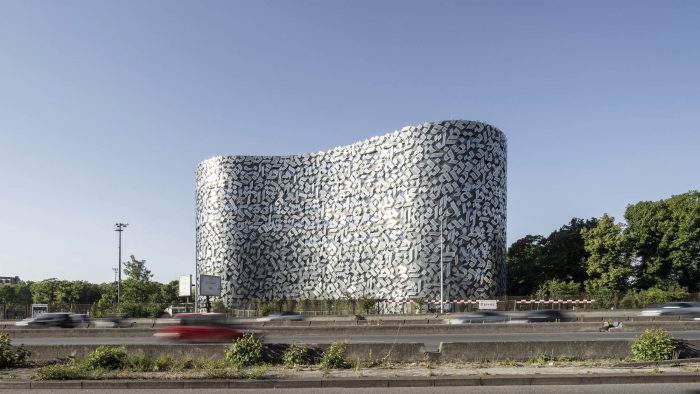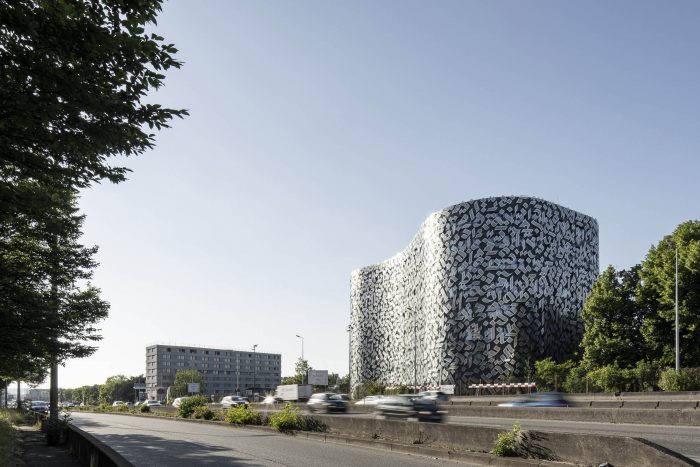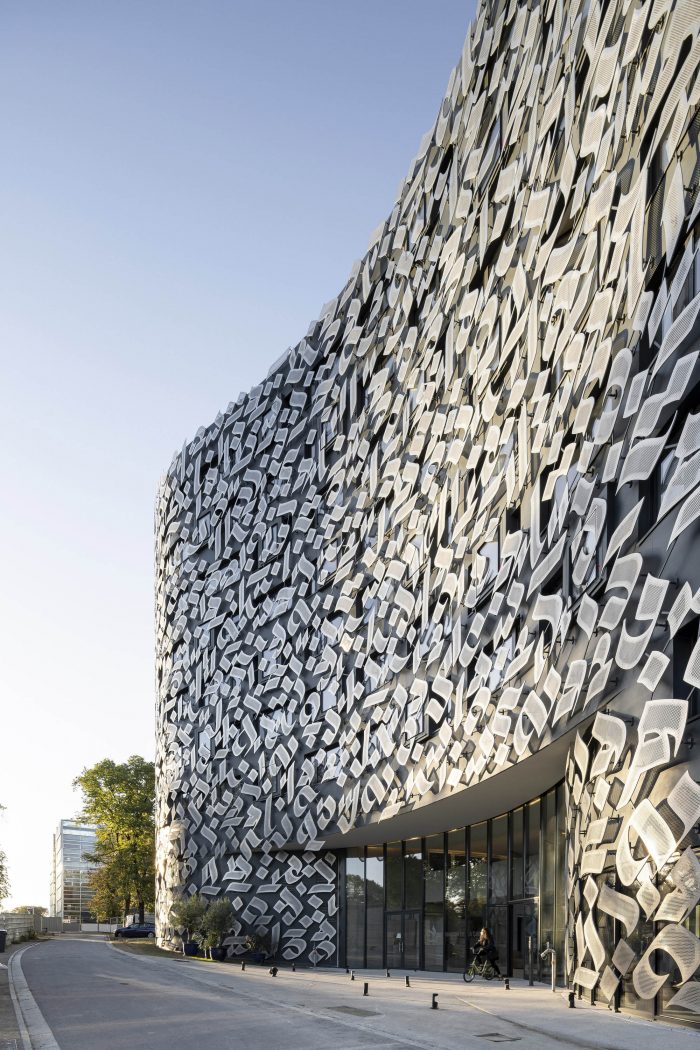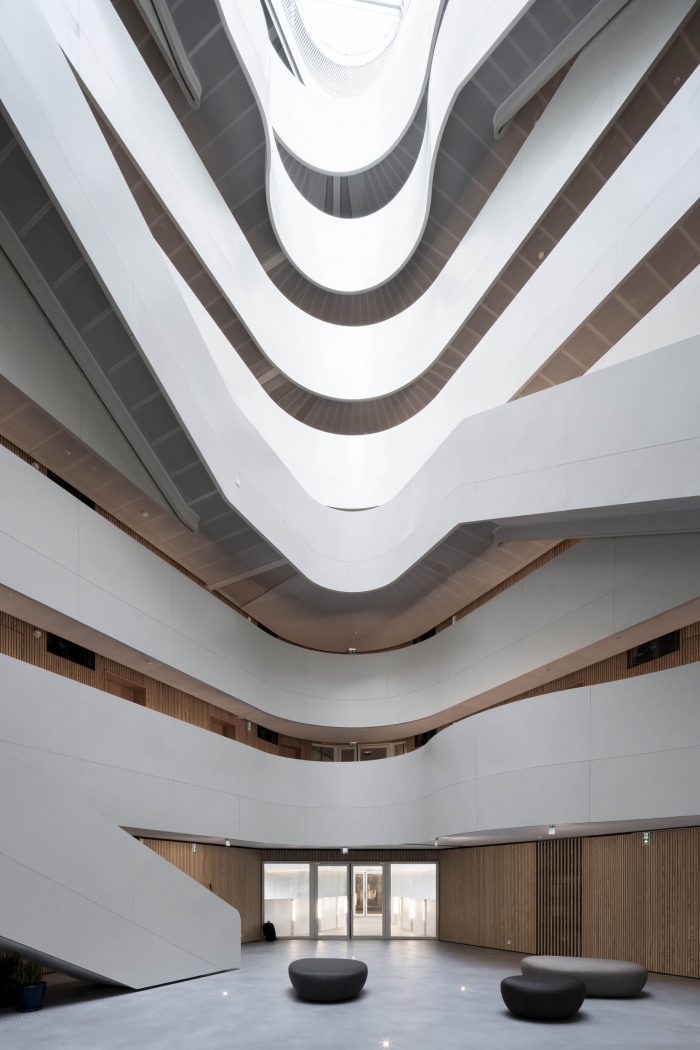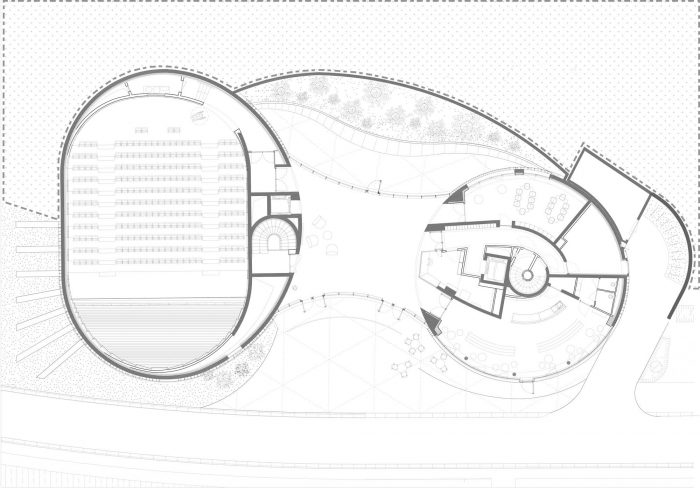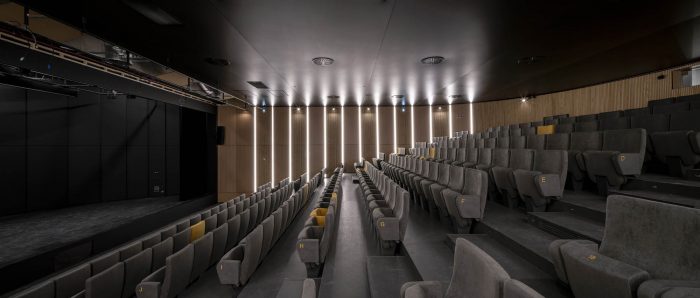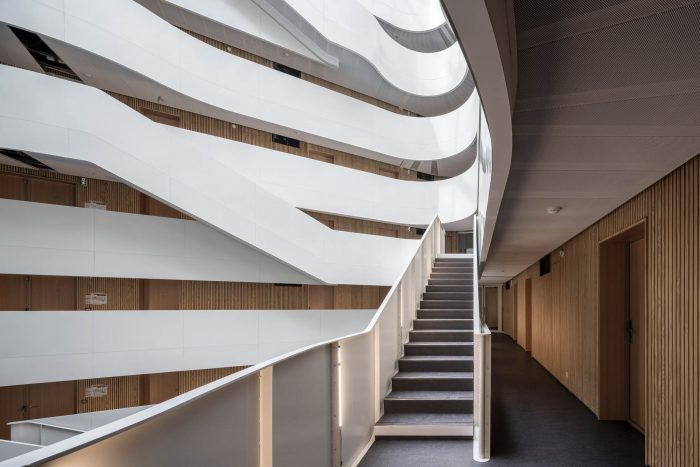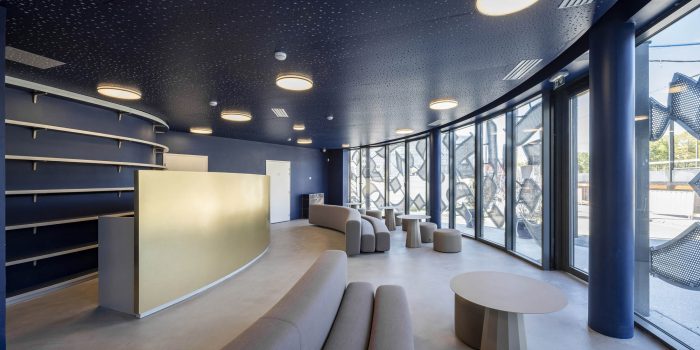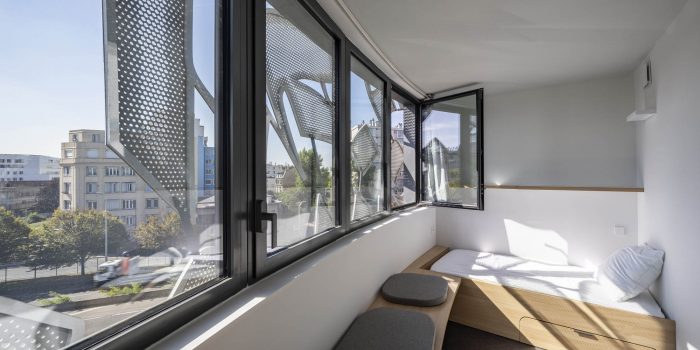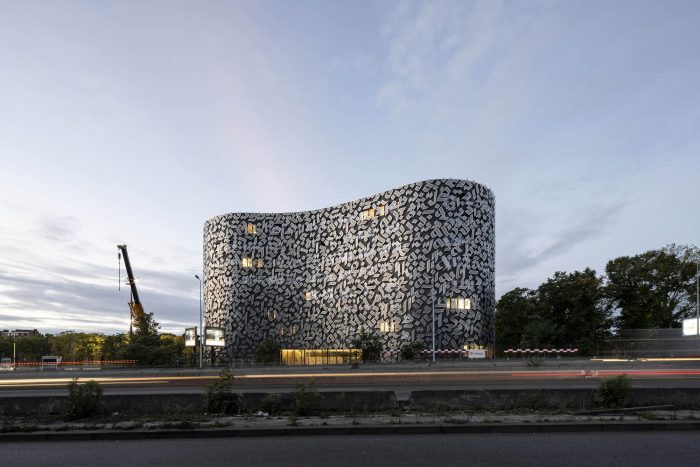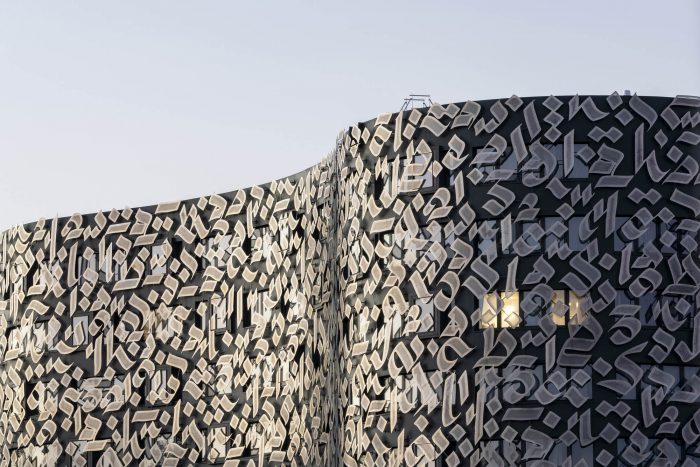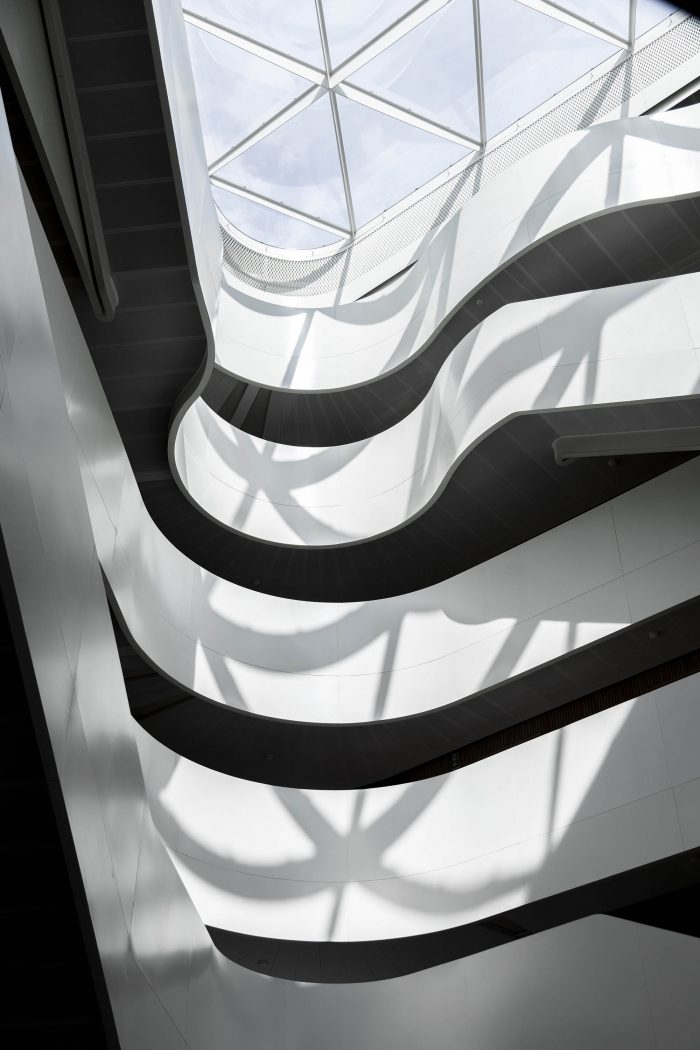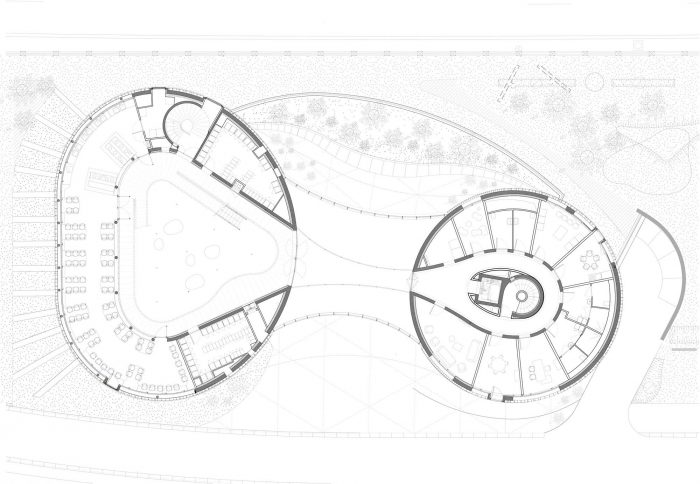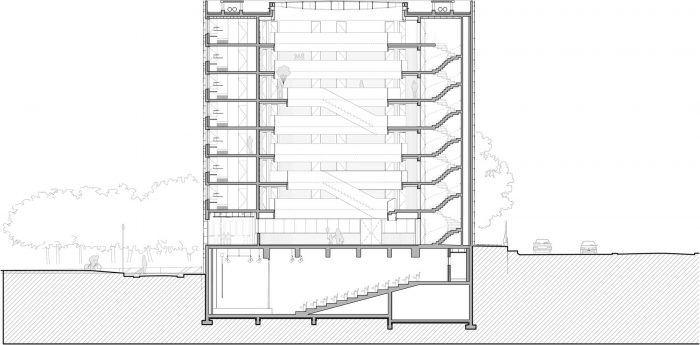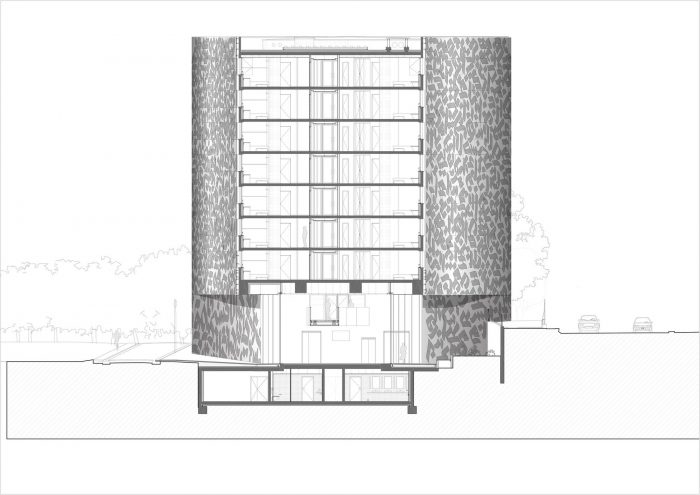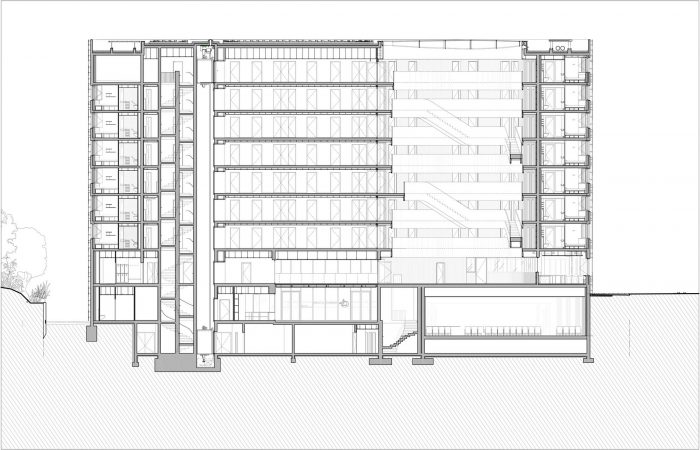Habib Bourguiba Hall是突尼斯政府资助的突尼斯之家基金会建造的第二座学生宿舍。它坐落在巴黎国际大学城–一个独特的文化、自然和建筑的集中地–神话般的绿叶中,使基金会可以容纳的学生人数增加了一倍。
The Habib Bourguiba Hall is the second student residence built by the Fondation de la Maison de Tunisie, which is funded by the Tunisian government. Located in the mythic leafy grounds of Paris’s Cité Internationale Universitaire — a unique concentration of cultures, nature, and architecture —, it allows the foundation to double the number of students it can accommodate.
我们的项目的有机形式克服了场地的困难,不仅暴露在自然环境中,而且还受到噪音和目光的影响。它的外部围护结构,既保护又团结,既是一个过滤器,又是一件艺术作品,一个抽象的书法作品,象征着它所代表的国家–突尼斯。
Our project’s organic form surmounts the difficulties of a site that is very exposed, not only to the elements but also to noise and the gaze. Its external envelope, which protects and unites, is at once a filter and a work of art, a calligraphic abstraction signifying the country it represents, Tunisia.
这座建筑为学生和研究人员提供了200间卧室,优先考虑公共空间,以确保温馨和学习的氛围。一个壮观的顶部照明中庭以其螺旋形的垂直连接将整个建筑连接起来。大楼还设有一个可容纳250人的礼堂、一个向公众开放的茶室、一个公共厨房/餐厅和一个阅览室。
Counting 200 bedrooms for both students and researchers, the building prioritizes communal spaces that ensure a welcoming and studious atmosphere. A spectacular top-lit atrium federates the whole with its spiraling vertical connections. The building also features a 250-seat auditorium, a tearoom open to the public, a communal kitchen/dining room, and a reading room.
在底层,弧形的立面将参观者自然地引向玻璃墙的入口大厅,后方是突尼斯风格的花园,公众可以进入。
At ground-floor level, the curving façade leads visitors naturally towards the glass-walled entrance hall with its Tunisian-style garden at the rear, which is accessible to the general public.
在内部,宿舍大厅环绕着流动的、充满光线的中庭,这是一个鼓励学生适当的接触和交流的空间。中庭将宿舍的所有空间结合起来,无论是公共空间(餐厅和休息区)还是私人空间(卧室),并组织建筑周围的活动。
Inside, the hall of residence wraps around fluid and light-filled atrium, a space of encounter and exchange that students are encouraged to appropriate. The atrium unites all the hall of residence’s spaces, whether communal (dining and lounge areas) or private (the bedrooms), and organizes movement around the building.
内部布局遵循客户的要求,将公共区和私人区完全分开。公共区;入口大厅进入建筑的三个公共空间;250个座位的礼堂占据了地下一层和地下室的部分空间;茶室位于地下一层靠近入口处,可以从外面直接进入;观赏花园
The internal layout follows the client’s request that public and private zones be kept entirely separate. The public zone; The entrance hall accesses the building’s three public spaces; the 250-seat auditorium occupies part of the ground floor and the basement; the tearoom is located on the ground floor near the entrance and can be directly accessed from outside; the ornamental garden
私人区域;主要的公共空间–餐厅/厨房、电视休息室、吸烟室、洗衣房–位于二层,还有员工设施和管理办公室。
The private zone; The main communal spaces — dining room/kitchen, TV lounge, smoking room, laundry — are located on the second storey, as are staff facilities and management offices.
厨房/餐厅是一个流动的、全景的、欢快的空间,围绕着宽敞的中庭,形成了大厅的心脏。中庭不仅将日光引入建筑中心,还鼓励居民之间进行更多的交流;它允许学生在非正式的环境中会面和交流;它避免了通常困扰宿舍的冗长、黑暗和单调的走廊;由于其开放的楼梯,它使楼层之间的连接成为一个社交奇观;它为居民提供了展览空间。
卧室都有全景窗,配备了定制的家具,其曲线形状与建筑相呼应(浴室和衣柜)。金色的木质书桌靠窗而立,根据人体工程学原理延伸为长椅,然后再延伸为床。
A fluid, panoptical, convivial space, the kitchen/dining room wraps around the generous atrium, which forms the beating heart of the hall. As well as bringing daylight down into the building’s centre, the atrium encourages greater interaction among residents; it allows students to meet and exchange in an informal setting; it avoids the long, dark, monotonous corridors that often blight halls of residence; it makes a social spectacle of the connections between floors thanks to its open stairs; it provides exhibition space for residents.
Fitted with panoramic windows, the bedrooms are equipped with bespoke appointments and furnishings whose curved forms echo the building (bathroom units and wardrobes). Set against the windows, the blonde-wood desks extend ergonomically into benches and then into beds.
建筑师:Explorations Architecture
面积: 5846 m²
年份:2020年
摄影:Salem Mostefaoui
首席建筑师:Benoît Le Thierry d’Ennequin
建筑师,项目总监:Claudia Trovati
建筑师,助理:Charles Eliot Meyer
建筑师:Lamine Ben Hibet
景观设计师:Marti Baron
技术顾问:OTE
城市:巴黎
国家:法国
Architects: Explorations Architecture
Area: 5846 m²
Year: 2020
Photographs: Salem Mostefaoui
Lead Architect:Benoît Le Thierry d’Ennequin
Architect, Project Director:Claudia Trovati
Architect, Assistant:Charles Eliot Meyer
Architect:Lamine Ben Hibet
Landscape Architects:Marti Baron
Technical Consultants:OTE
City:Paris
Country:France


